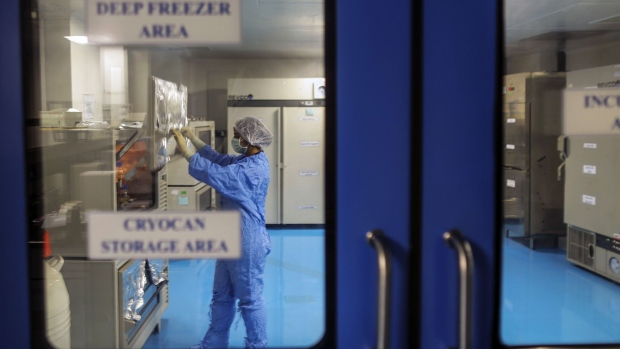Jun 13, 2019
Gene-Editing Pioneers to Join With Glaxo in Hunt for Novel Drugs
, Bloomberg News

(Bloomberg) -- Pioneers in the field of gene-editing technology will collaborate with one of the world’s biggest drugmakers on accelerating the search for new medicines using the promising tool known as Crispr.
University of California scientists led by Crispr co-inventor Jennifer Doudna will join GlaxoSmithKline Plc in a five-year partnership aimed at cancer, the immune system and neuroscience. The U.K. pharma company said Thursday that it will contribute as much as $67 million to set up a new lab in San Francisco that will bring researchers from big pharma and academia together under one roof.
Heralded as a revolutionary approach to tackling diseases caused by defective genes, Crispr allows scientists to snip out sections of DNA and replace them with new genetic instructions. The project is a sign of Glaxo’s revamped strategy and increasing focus on cutting-edge technologies with Hal Barron, a former executive at biotech firm Genentech, now steering its research efforts.
The goal is to use Crispr to find novel targets for potential drugs “at a pace previously thought impossible,” Barron told reporters on a conference call. The tool is “probably one of the most important technologies of our time.”
Glaxo’s R&D chief has started to reshape Glaxo’s hunt for medicines in areas such as cancer. The British drugmaker last year acquired a $300 million stake in 23andMe Inc. and signed a four-year pact with the company to tap genetic data to find new drug targets and better select patients for studies.
Now Barron, who completed his training as a doctor at the University of California, San Francisco, will team up with Doudna and Jonathan Weissman, a leader in Crispr screening technology at the university.
In 2012, Doudna and French researcher Emmanuelle Charpentier co-published the first findings showing that Crispr, interacting with the protein Cas9, could edit the genes of a bacterial cell. Doudna, a professor of chemistry and molecular and cell biology at the University of California, Berkeley, moved part of her research activities last year to an independent research institute affiliated UCSF.
Berkeley and its partner the University of Vienna have been fighting with the Harvard University-affiliated Broad Institute over who gets the credit for inventing the breakthrough technology.
The Laboratory for Genomic Research plans to hunt for new drug candidates and technologies, while Glaxo’s artificial intelligence and machine learning group will play a role in analyzing the data. Any breakthroughs from the project will be made available for use by other labs, but Glaxo will have the first option on potential new targets to try to turn them into medicines, Barron said.
Developments in the use of the technology are being closely watched globally. Last year, a Chinese researcher stunned scientists after claiming to have created the world’s first genetically edited babies, prompting researchers and ethicists to call for a partial ban.
Rather than such drastic interventions, the new program is aimed at “really fundamental discovery science,” Doudna said on the call. “I don’t think there’s any intention right now to be editing human embryos.”
Potential safety concerns and the prospect of onerous clinical and regulatory hurdles have put such therapies years away from U.S. approval, yet the field is hitting new milestones. Doctors at the University of Pennsylvania earlier this year infused two cancer patients with a Crispr-based medicine in an early human trial. Swiss-based Crispr Therapeutics AG and partner Vertex Pharmaceuticals Inc., based in Boston, dosed their first patient in February.
To contact the reporter on this story: James Paton in London at jpaton4@bloomberg.net
To contact the editors responsible for this story: Eric Pfanner at epfanner1@bloomberg.net, John Lauerman
©2019 Bloomberg L.P.





